Jeep Compass vs Toyota RAV4 - Differences and prices compared
Compare performance (225 HP vs 306 HP), boot space and price (34200 £ vs 35100 £ ) at a glance. Find out which car is the better choice for you – Jeep Compass or Toyota RAV4?
Costs and Efficiency:
Price and efficiency are key factors when choosing a car – and this is often where the real differences emerge.
Jeep Compass has a minimal advantage in terms of price – it starts at 34200 £ , while the Toyota RAV4 costs 35100 £ . That’s a price difference of around 934 £.
Fuel consumption also shows a difference: Toyota RAV4 manages with 1 L and is therefore significantly more efficient than the Jeep Compass with 3 L. The difference is about 2 L per 100 km.
As for electric range, the Jeep Compass performs significantly better – achieving up to 500 km, about 425 km more than the Toyota RAV4.
Engine and Performance:
Power, torque and acceleration are the classic benchmarks for car enthusiasts – and here, some clear differences start to show.
When it comes to engine power, the Toyota RAV4 has a clearly perceptible edge – offering 306 HP compared to 225 HP. That’s roughly 81 HP more horsepower.
In acceleration from 0 to 100 km/h, the Toyota RAV4 is clearly perceptible quicker – completing the sprint in 6 s, while the Jeep Compass takes 8 s. That’s about 2 s faster.
In terms of top speed, the Jeep Compass performs hardly perceptible better – reaching 188 km/h, while the Toyota RAV4 tops out at 180 km/h. The difference is around 8 km/h.
Space and Everyday Use:
Cabin size, boot volume and payload all play a role in everyday practicality. Here, comfort and flexibility make the difference.
Both vehicles offer seating for 5 people.
In curb weight, Jeep Compass is hardly perceptible lighter – 1667 kg compared to 1745 kg. The difference is around 78 kg.
In terms of boot space, the Toyota RAV4 offers barely noticeable more room – 580 L compared to 550 L. That’s a difference of about 30 L.
In maximum load capacity, the Toyota RAV4 performs slight better – up to 1690 L, which is about 129 L more than the Jeep Compass.
Who wins the race in the data check?
The Toyota RAV4 is far ahead overall in the objective data comparison.
This result only shows which model scores more points on paper – not which of the two cars feels right for you.
Costs and Consumption
View detailed analysis
Engine and Performance
View detailed analysis
Dimensions and Body
View detailed analysis
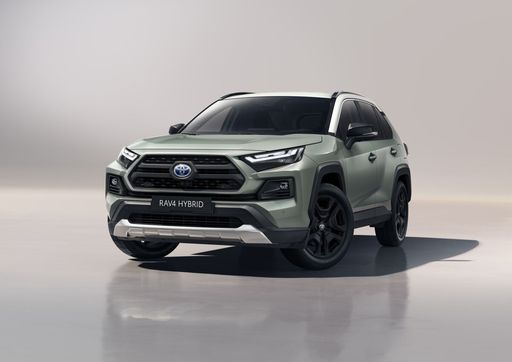
Toyota RAV4
Jeep Compass
The Jeep Compass packs classic Jeep styling with a surprisingly composed demeanor, equally at home turning heads in the city or tackling a weekend dirt track. Inside it's a pragmatic, user-friendly compact SUV that prioritizes comfort and versatility — a smart pick if you want a dose of adventure without giving up everyday sense.
details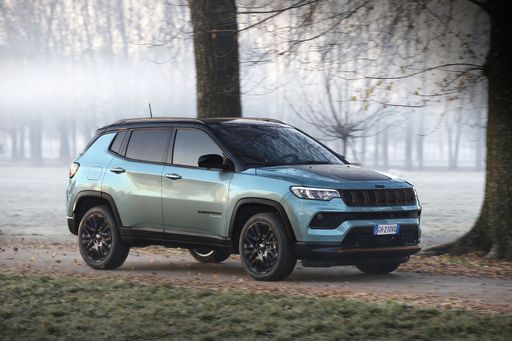
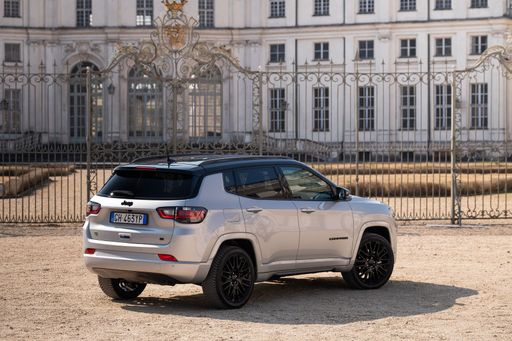
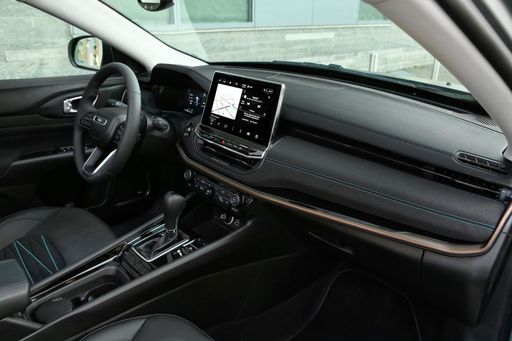
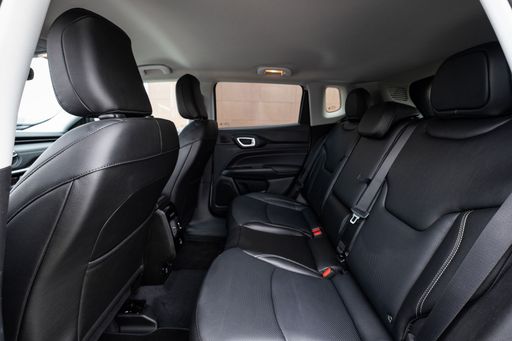
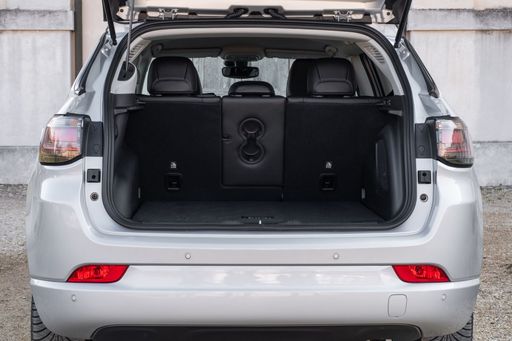
Toyota RAV4
The Toyota RAV4 feels like a sensible friend on the road, marrying dependable practicality with a dash of SUV personality that keeps daily driving from turning dull. Comfortable and easy to live with, it looks tough without shouting and quietly gets the job done — a sensible pick for buyers who want versatility without drama.
details
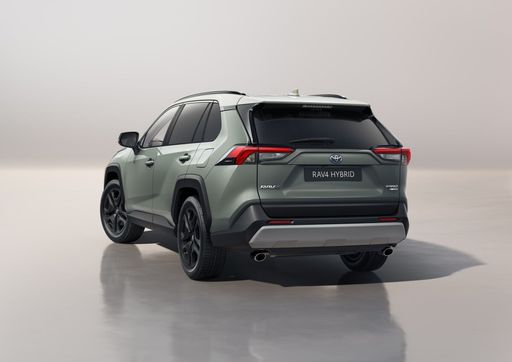
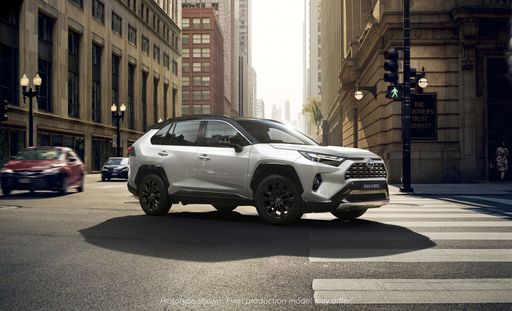
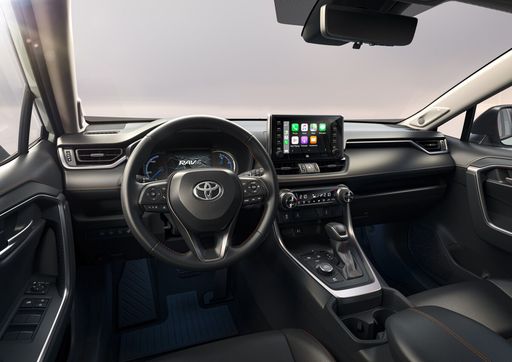
Costs and Consumption |
|
|---|---|
|
Price
34200 - 43200 £
|
Price
35100 - 55700 £
|
|
Consumption L/100km
3 - 5.8 L
|
Consumption L/100km
1 - 5.6 L
|
|
Consumption kWh/100km
17.50 kWh
|
Consumption kWh/100km
-
|
|
Electric Range
95 - 500 km
|
Electric Range
75 km
|
|
Battery Capacity
74 kWh
|
Battery Capacity
-
|
|
co2
0 - 130 g/km
|
co2
22 - 128 g/km
|
|
Fuel tank capacity
55 L
|
Fuel tank capacity
55 L
|
Dimensions and Body |
|
|---|---|
|
Body Type
SUV
|
Body Type
SUV
|
|
Seats
5
|
Seats
5
|
|
Doors
5
|
Doors
5
|
|
Curb weight
1667 - 2198 kg
|
Curb weight
1745 - 1910 kg
|
|
Trunk capacity
550 L
|
Trunk capacity
520 - 580 L
|
|
Length
4552 mm
|
Length
4600 mm
|
|
Width
1928 mm
|
Width
1855 mm
|
|
Height
1675 mm
|
Height
1685 mm
|
|
Max trunk capacity
1561 L
|
Max trunk capacity
1604 - 1690 L
|
|
Payload
-
|
Payload
390 - 600 kg
|
Engine and Performance |
|
|---|---|
|
Engine Type
Petrol MHEV, Electric, Plugin Hybrid
|
Engine Type
Full Hybrid, Plugin Hybrid
|
|
Transmission
Automatic
|
Transmission
Automatic
|
|
Transmission Detail
Dual-Clutch Automatic, Reduction Gearbox
|
Transmission Detail
CVT
|
|
Drive Type
Front-Wheel Drive
|
Drive Type
Front-Wheel Drive, All-Wheel Drive
|
|
Power HP
145 - 225 HP
|
Power HP
218 - 306 HP
|
|
Acceleration 0-100km/h
8 - 10.3 s
|
Acceleration 0-100km/h
6 - 8.4 s
|
|
Max Speed
180 - 188 km/h
|
Max Speed
180 km/h
|
|
Torque
230 - 345 Nm
|
Torque
-
|
|
Number of Cylinders
3 - 4
|
Number of Cylinders
4
|
|
Power kW
107 - 165 kW
|
Power kW
160 - 225 kW
|
|
Engine capacity
1199 - 1596 cm3
|
Engine capacity
2487 cm3
|
General |
|
|---|---|
|
Model Year
2025 - 2026
|
Model Year
2024 - 2025
|
|
CO2 Efficiency Class
D, A, B
|
CO2 Efficiency Class
D, B
|
|
Brand
Jeep
|
Brand
Toyota
|
What drivetrain options does the Jeep Compass have?
The Jeep Compass is available as Front-Wheel Drive.
